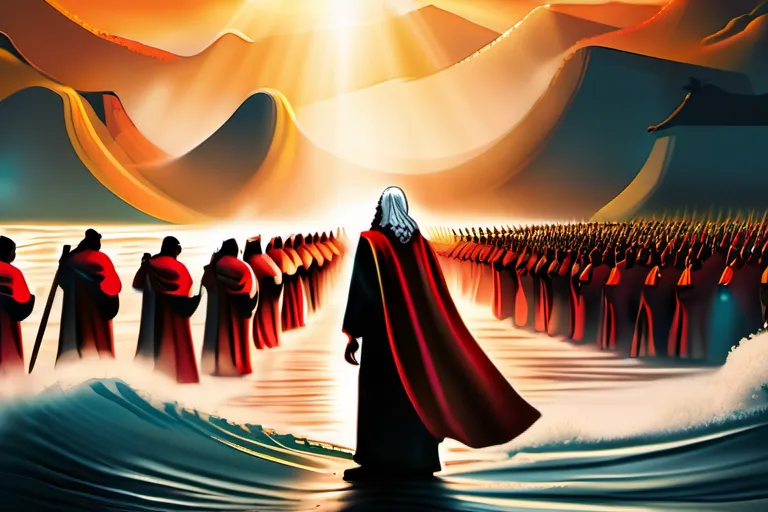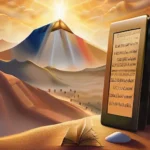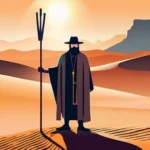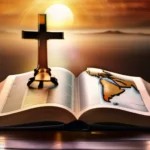Explore the influential life, leadership, and impact of Moses in the Bible.
Discover the fascinating story of Moses, a central figure in both the Hebrew Bible and Islamic tradition. Learn about his birth, early life, divine call, and remarkable leadership as he led the Israelites out of Egypt and into the Promised Land.
Early Life and Calling
Imagine a young man, brought up in luxury and comfort, unaware of his true identity until one fateful day. Moses, born to a Hebrew family, found himself in the cradle of power when he was adopted by the Pharaoh’s daughter. This decision, much like a seed planted in fertile soil, allowed him to grow into a leader who would later set free an entire nation.
Can you picture the moment when Moses realized his true heritage? As he watched Hebrew slaves working tirelessly under harsh conditions, he must have felt a deep sense of injustice and longing for change. His early life was a blend of privilege and pain, both of which played crucial roles in shaping his future as a leader.
The burning bush encounter with God marked the pivotal moment in Moses’ life. As the burning bush symbolized the presence of the divine, it posed a question to Moses: ‘Why do you stand idly by while your people suffer?’ This rhetorical question echoed through time, challenging every leader who would follow in his footsteps.
Moses initially hesitated, just as many leaders today face doubts when called to serve. But God’s reassurance came swiftly, with a promise that he would be Moses’ voice. This divine appointment was not just about speaking for the oppressed; it was about transforming voices into actions, leading a people from bondage to freedom.
The burning bush encounter was more than an event; it was a metaphor for leadership itself. It taught Moses that true leadership is about seeing beyond one’s own comfort and embracing the challenges of those who are less fortunate. This divine calling would not only change Moses’ life but also set in motion a series of events that would reverberate through history.
Leading the Israelites
Imagine leading your people through the most formidable challenges, navigating treacherous waters and desolate deserts, all while facing the wrath of one of history’s mightiest rulers. Moses did just that—his leadership was not just a matter of command but a profound journey marked by divine intervention and steadfast determination.
Consider the backdrop: Egypt, with its opulent palaces and powerful Pharaoh, had enslaved the Israelites. Moses stepped into this maelstrom as an unlikely hero, armed only with his faith and the burning bush. The plagues he wielded were not mere acts of magic; they were signs of divine power, each one a testament to God’s might and His plan for deliverance.
The Ten Plagues unfolded like a saga, each one more catastrophic than the last. From frogs to locusts, from darkness to death—Moses’ words echoed through the land as divine judgments rained down on Egypt. It was a dramatic dance of faith and fear, where Moses stood firm, his actions rooted in God’s unshakeable promise.
The climax came with the parting of the Red Sea. Imagine standing at the edge, watching the waters divide, revealing a path for escape. It was more than just an act; it was a miracle of hope, where faith and fear met in the midst of chaos. The Israelites crossed on dry land, their salvation paved by divine intervention.
In the wilderness, Moses faced yet another test with the provision of manna and water. Manna, like crumbs from heaven, sustained a nation wandering in uncertainty. Water from the rock, a striking metaphor for God’s constant provision, reminded them that even in thirst, they could find sustenance. These gifts were not just physical; they were symbolic, nourishing souls on their journey to freedom.
Moses’ leadership was a blend of authority and empathy. He led with a broad vision for the future, guiding his people through trials that tested not only their faith but also their resolve. His journey from a prince in Egypt to a leader in the wilderness is a story of transformation—of a man who found his true calling and purpose.
As we reflect on Moses’ leadership, we are reminded that true strength lies in following divine guidance, even when it seems impossible. His legacy remains a beacon of hope, showing us that even in the darkest moments, there is always light—and a way forward.
The Ten Commandments
Imagine a moment so pivotal that it echoes through history, shaping the very fabric of three major world religions: Judaism, Christianity, and Islam. It was on Mount Sinai, amidst thunder and lightning, that Moses received the Ten Commandments, a set of divine laws that would guide billions in their moral and spiritual journeys. How did this encounter come to pass?
As the Israelites wandered in the wilderness, they faced countless challenges and temptations. They questioned their faith and doubted God’s promises. In such a moment, Moses ascended Mount Sinai, his mission clear: to receive instructions that would provide a roadmap for these wandering souls.
- Moses’ journey up the mountain was not just physical; it was a profound spiritual ascent, akin to embarking on a metaphorical voyage into the unknown realms of divine will. What drove him to undertake such a perilous climb?
When Moses descended with the Ten Commandments, inscribed by God’s finger upon stone tablets, he carried more than just laws; he bore the weight of responsibility for the future of an entire people. These commandments, etched in stone and yet so much more, were a testament to the grandeur and complexity of God’s covenant with humanity.
- Imagine holding such a sacred burden, knowing that your words would influence generations to come. How did Moses prepare for this monumental task?
The Ten Commandments, with their emphasis on honoring parents, refraining from murder and theft, and keeping the Sabbath holy, laid down principles that transcended cultural boundaries. They spoke of love, justice, and respect, values that continue to resonate in our modern world.
- How do these commandments reflect the essence of Mosaic law, and what makes them so enduring? Are they simply rules, or are they a guide to living a life of purpose and meaning?
The significance of the Ten Commandments extends beyond religious doctrine. They serve as a moral compass, offering guidance on how we interact with one another and navigate our responsibilities in society. In this sense, they embody the very essence of human dignity and ethical behavior.
- How do you think these commandments would fare if presented to modern societies? Are there aspects that remain relevant, or are they outdated?
The Ten Commandments stand as a testament to Moses’ leadership and his unwavering faith. They represent more than just religious laws; they symbolize the enduring power of divine revelation and the profound impact one individual can have on history.
- What lessons can we draw from Moses’ experience at Mount Sinai? How might these insights shape our own lives and interactions with others?
Moses’ Death and Legacy
Moses, after leading his people out of slavery and through the wilderness, finally reached the land that would be their promised home. Yet, it was here where his journey faced its most poignant and profound challenge. As Moses stood on the summit of Mount Nebo, the view before him must have felt like a bittersweet embrace; a vista he could see but never tread upon.
Did Moses feel a sense of accomplishment as he gazed at the Promised Land? Or was it a moment tinged with a profound sadness, knowing that his own path to the land was cut short? The Bible tells us that God took Moses up on the mountain and showed him this land, but it was not meant for him. Was this divine gesture merely a final act of mercy or perhaps an acknowledgment of Moses’ limitations?
Imagine the weight of Moses’ leadership; he had guided his people through trials, taught them the commandments, and brought them closer to understanding the nature of their faith. But now, as he prepares for death, one wonders: How much of a leader is one who can only point the way but cannot walk it fully?
And so, Moses died, leaving behind not just a legacy but a profound impact on religious history. The Jewish tradition remembers him as the lawgiver and the deliverer; Christians see him as a precursor to Jesus; Muslims revere him as one of the greatest prophets.
- Moses’ death marked the end of an era, yet his teachings continue to shape moral and spiritual frameworks worldwide.
- His role in history is not just about leading out of slavery or receiving commandments. It’s about the transformation of a community from oppression to freedom, from ignorance to enlightenment.
As we reflect on Moses’ life, can we find parallels in our own journeys? Do we sometimes feel like Moses, guiding others but unable to fully experience what they do? The legacy of Moses lies not only in his achievements but also in the questions he raises about leadership and divine purpose. In understanding Moses’ death and legacy, we might learn more about our own paths through life.
Indeed, just as Moses looked out upon a land not meant for him, we too may find ourselves looking at horizons that are tantalizingly close yet beyond reach. But the journey itself, the lessons learned, and the impact on others—these are what truly matter in our lives as they were in his.
Moses in Islamic Tradition
How does Moses, a figure so central to the history and faiths of millions, fare in the pages of the Quran? The answer reveals a rich tapestry of prophetic tradition that intertwines with biblical narratives but also offers unique insights into his role and legacy.
In Islam, Moses is known as Musa, one of the prophets sent by Allah to guide humanity. His life story, much like in the Bible, begins with a miraculous birth and an early escape from Pharaoh’s persecution. The Quran recounts how Musa was found by Pharaoh’s wife and raised in the palace, only to later confront his former oppressor with the truth of his identity and mission.
One of the key themes in Moses’ story is his role as a deliverer and lawgiver. In Islamic tradition, he is celebrated for leading the Israelites out of Egypt, not just physically but spiritually as well. The Quran emphasizes Musa’s role in bringing down the Tawhid (monotheism) to the people, highlighting his struggle against idolatry and his commitment to one true God.
The stories of Moses parting the Red Sea and receiving the tablets of the law are retold with a focus on divine intervention and the importance of submission to Allah’s will. These events serve as powerful symbols of faith and perseverance in the face of adversity, showcasing Musa’s unwavering commitment to his mission.
Interestingly, in Islam, Moses is often depicted as more than just a prophet; he is seen as a role model for both men and women, emphasizing humility and devotion. The Quranic portrayal of him interacting with Miriam (Mary) and other figures adds depth to his character, illustrating the importance of respect and unity within faith communities.
Musa’s teachings in Islam are not just historical anecdotes; they are a living part of the Islamic tradition. His stories continue to inspire Muslims, reminding them of the power of submission, faith, and the struggle against injustice. As we delve into these narratives, we cannot help but wonder: How do the tales of Musa shape our understanding of divine guidance and leadership?
The life of Moses in Islam is a profound exploration of prophethood, leadership, and the eternal struggle between good and evil. Through his stories, Muslims find not only inspiration but also practical lessons on how to live a life dedicated to serving Allah.
The Enduring Legacy of Moses
The enduring legacy of Moses, as depicted in the Bible, has left an indelible mark on Western culture, philosophy, and political thought. How many times have you pondered the significance of a leader who not only guided his people but also influenced countless generations? Moses, with his firm resolve, serves as a beacon of leadership for those navigating turbulent times.
Moses’ story, rich in metaphorical layers and profound lessons, continues to resonate. Is it not fascinating how his tale of freedom from oppression mirrors the struggles of nations worldwide? His confrontation with Pharaoh can be seen as an allegory for the ongoing fight against tyranny. In this struggle, Moses symbolizes the voice of the oppressed, a figure who refuses to bow under injustice.
The Ten Commandments, engraved on tablets, are more than just laws; they represent the moral compass that has guided humanity for centuries. How many times have these commandments been cited in discussions about morality and governance? They stand as a testament to Moses’ wisdom and his commitment to justice. In a world often marred by conflict, Moses’ teachings remind us of the importance of peace and righteousness.
Moreover, Moses’ leadership style is a fascinating subject for study. His approach, marked by both humility and assertiveness, serves as a model for effective governance. How do you think Moses would navigate modern political landscapes? Would his methods still be relevant in today’s complex world?
The impact of Moses extends beyond religious boundaries. Philosophers, politicians, and activists have drawn inspiration from his journey. His story has been retold countless times in literature and art, each rendition adding a new layer to its meaning. How do you interpret the symbolism in these retellings? What new insights can we gain from them?
Moses’ legacy is not just historical; it is living, influencing every facet of society. From legal systems to ethical frameworks, his influence is undeniable. As we continue to grapple with issues of freedom, justice, and morality, Moses remains a central figure. Can you imagine a world without the echoes of his voice? His story teaches us that even in the darkest of times, there is always hope.
Conclusion
 Understand the lasting legacy of Moses as a prophet, lawgiver, and military leader who shaped the history and faith of millions for centuries to come.
Understand the lasting legacy of Moses as a prophet, lawgiver, and military leader who shaped the history and faith of millions for centuries to come.











